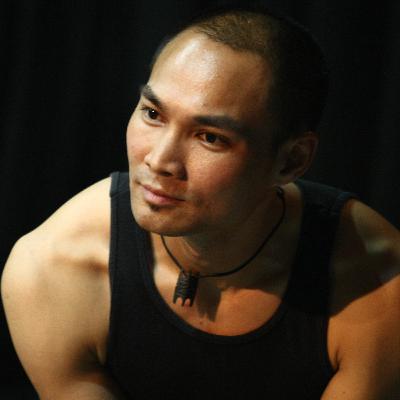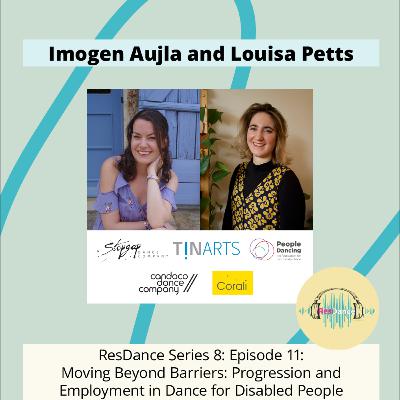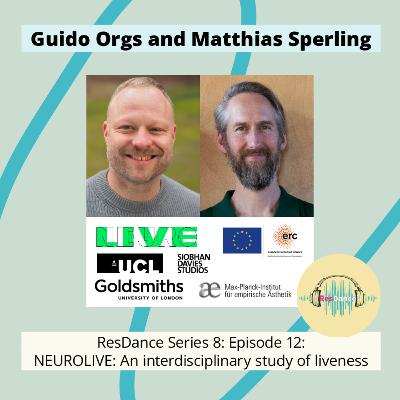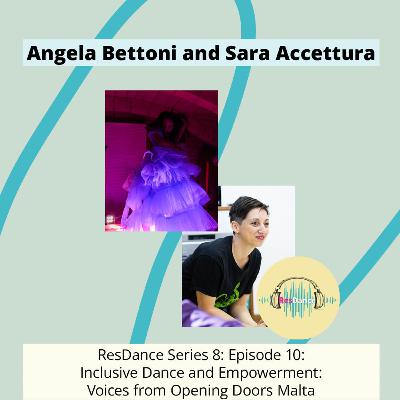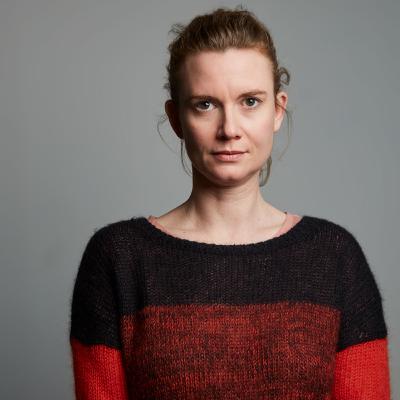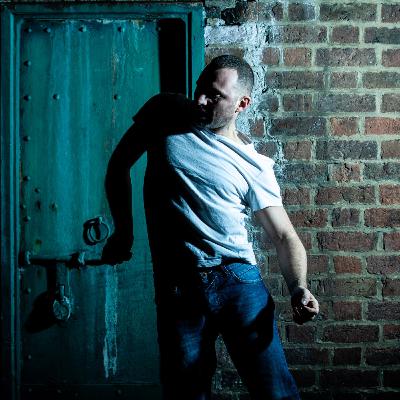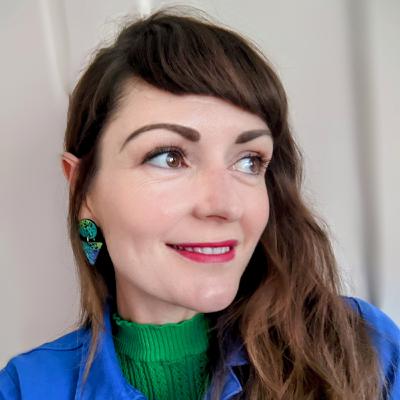Discover ResDance
ResDance

ResDance
Author: Dr. Gemma Harman
Subscribed: 1Played: 1Subscribe
Share
© Dr. Gemma Harman
Description
A podcast dedicated to research in dance practice, intended for educators, students, practitioners and performers and interdisciplinary researchers curious to learn more about dance research in action.
Series 1 - 7 of ResDance are now live!
podcasters.spotify.com/pod/show/resdance
Social media platforms - follow ResDance:
Instagram: @resdancepodcast
Facebook: facebook.com/resdancepodcast
Twitter: @GemmaHarman8
Series 1 - 7 of ResDance are now live!
podcasters.spotify.com/pod/show/resdance
Social media platforms - follow ResDance:
Instagram: @resdancepodcast
Facebook: facebook.com/resdancepodcast
Twitter: @GemmaHarman8
107 Episodes
Reverse
ResDance Series 9: Episode 11: Curating ResDance: Gemma Harman on 100 Episodes of ResDanceIn this episode, Gemma reflects on her journey curating 100 episodes of the ResDance™podcast alongside her friend and colleague, Elsa Urmston. Situating the conversation within Gemma’s wider practice as an educator and researcher, they discuss the founding of ResDance, the key themes that have emerged from contributors to date, and the processesinvolved in recording the podcast. They explore the role of ResDance in celebrating and amplifying individual artists’ voices, while also engaging listeners with emergent ideas and practices central to dance research. Through the conversation, they consider the podcast as a site of practice, reflectingon its value in articulating how dance is situated within wider research contexts, while foregrounding the ongoing contribution ResDance makes to the broader dance field.BiographyDr Gemma Harman is an Independent Dance Educator,Researcher and Podcaster. She originally trained as a dancer before specialising in areas of dance, music and dance medicine and science. Gemma has a BA (Hons) in Performing Arts (majoring in Dance) from Middlesex Universityand an MSc Dance Science and PhD Dance and Music Science from Trinity Laban (supported by the Emerton Christie Charity). She has extensive lecturing experience as a teacher, lecturer and researcher, delivering a range of specialisms, where she continues to work across vocational and Higher Education settings as a researcher and lecturer. Until recently (January 2026), Gemma was a Senior Lecturer in Dance and Dance Science, BSc Programme Leader and MA ProgrammeCo-ordinator at the University of Chichester. Gemma won the One Dance UK ‘Research In Dance Award’ in 2025 for her work with ResDance™.Website and Social media channels@resdancepodcast Other relevant linkshttps://www.routledge.com/Practitioner-Perspectives-on-Dance-Research/Harman/p/book/9781032566795 https://www.chi.ac.uk/news/award-winning-gemma-celebrates-one-dance-uk-win/ Please share this episode with students,educators, practitioners, performers, and interdisciplinary researchers curious to learn more about dance research in action.
ResDance Series 9: Episode 10: The mental side of injury with Carl BescobyIn this episode, Carl shares insights from his work as a psychologist, practitioner, educator, and researcher. Drawing on his interest in the intersection of injury, pain, recovery, and performance, the conversation explores the psychological dimensions of injury and rehabilitation. Through exploringthe psychosocial models of injury and the role stress plays in injury occurrence, we discuss the importance of supporting individuals through the emotional experiences that accompany injury.We explore barriers to implementing psychological support across different contexts, common misunderstandings around emotional responses to injury, and the challenges of translating psychological language and concepts for diversepopulations. Carl also highlights the need for greater attention to psychological care during rehabilitation, which is often overshadowed by an emphasis solely on physical recovery.Through his work, Carl is committed to shaping a culture of greater understanding and change. He shares insights into his workshops, the development of evidence-based resources, and the delivery of individually tailored coaching. A key takeaway from the episode is that injury—or anunintended pause—can become an opportunity for personal growth, enabling a more holistic approach to recovery.BiographyDr Carl Bescoby is an injury psychologist working at the intersection of injury, health, wellbeing, and performance. Carl works with injured athletes & performers through one-to-one consultancy and provides group workshops/psychoeducation to help cultivate a greater awareness of the psychosocial components of injury and rehabilitation to enable positive adjustment and growth throughout recovery and return to activity. Carl also delivers training to support healthcare professionals, clinicians, and physiotherapists with evidence-based psychological practice to support the mental health and wellbeing needs of service users. https://www.theinjurypsychologist.com/aboutContact detailsEmail: carl@theinjurypsychologist.comInstagram: https://www.instagram.com/theinjurypsychologist/?hl=enPlease share this episode with students, educators, practitioners, performers, and interdisciplinary researchers curious to learn more about dance research in action.
ResDance Series 9: Episode 9: Breaking Barriers: Racial Equity in Dance with Imogen Aujla and Stacey Green In this second episode with ResDance, Stacey and Imogen explore their thinking around racial equity in dance. Drawing on the work of the TIRED movement and their three-year RED Research Project into representation in dance training and education, they share key findings and discuss the development of an evidence-informed framework for institutions. The conversation centres on the barriers faced by those from the global majority in accessing training and education, the role of research in driving meaningful change, and the need for greater transparency, leadership, and collective responsibility across the sector. Stacey and Imogen reflect on positive institutional shifts emerging through the RED project; the wider work of TIRED; celebrate the ongoing impact of TIRED Ambassadors and young people paving the way for change and share recent milestones — including the launch of the TIRED Connect platform and two academic publications. This episode is one of hope, responsibility, and a shared commitment to collective change. Biography: Imogen Aujla Imogen is a dance psychology specialist from Dance in Mind. Her work covers research, lecturing, resource development, and psychological coaching. She originally trained as a dancer before specialising in dance science and later dance psychology. She has a PhD in dance psychology and a Diploma in Cognitive Behavioural Therapy. Prior to going freelance, Imogen was a Senior Lecturer in Dance and Course Coordinator of the MSc Dance Science at the University of Bedfordshire. As well as her project-based freelance work, she is a regular guest tutor on the MAS Dance Science at the University of Bern, Switzerland, and is a peer tutor for the mental health charity Mind. Imogen is passionate about research that contributes to social justice and that has practical impact. www.danceinmind.org Contact details: Facebook: @danceinmindUK Instagram: @dance_in_mind_UK Website: www.danceinmind.org Published sources:https://www.danceinmind.org/post/let-s-talk-about-representation-in-dance https://www.tiredmovement.com/research-project/ https://www.tiredmovement.com/imogen-aujla/ Biography: Stacey Green Stacey Green is the co-founder of both the TIRED Movement (Trying to Improve Racial Equality in Dance) and the UK’s new inclusive dance brand, Shades Dancewear. She is also the principal of a well-established dance school with over 30yrs teaching experience. She currently delivers talks all over the UK, raising awareness about the importance of racial representation in dance education. Stacey is the brainchild of the RED (Representation and Equity in Dance) research project, which has developed a framework that teachers, schools, and colleges can use to enable them to become diverse and inclusive. Shades Dancewear is the first UK dance brand to offer four shades in 5 products in all children’s and adult sizes. Shades are now selling their products to a number of West End shows including MJ Musical, Starlight Express and Hamilton the Musical. Using their unique new face recognition app “Shadify”, dancers can now find the perfect shade to match their skin tone before they buy, allowing dancers to embrace their ethnicity, and retain their identity. Contact details: info@tiredmovement.com @movementtired on Instagram TIRED Movement on Facebook www.tiredmovement.com https://tiredconnect.com/ Other social media handles: info@shades-dancewear.com @shadesdancewear on Instagram, TikTok, X, Facebook, Pinterest www.shades-dancewear.com Other related links: Two published papers from the RED project: https://accscience.com/journal/AC/3/1/10.36922/ac.3165 https://accscience.com/journal/AC/articles/online_first/4709 Please share this episode with students, educators, practitioners, performers, and interdisciplinary researchers curious to learn more about dance research in action.
ResDance Series 9: Episode 8: The menstrual cycle in pedagogical contexts: a shared responsibility towards sustainable body literacy and agency with Clarisse RoudIn this episode, Clarisse shares insights into her background and work as a movement artist, educator, and researcher, focusing on female-related challenges within pedagogical contexts. Through her teaching practices, we explore how critical pedagogy shapes her work and supports individuals in finding their voice and agency. Drawing on her research interests, Clarisse discusses her MA dissertation and the need for greater acknowledgment of menstrual cycle symptoms, particularly in relation to sustaining training and overall wellbeing. She advocates for holistic, responsive approaches that honour individual needs and promote self-understanding, positioning the studio as a progressive space that actively supports the female student.BiographyClarisse Roud is a Swiss-born, London-based movement artist and educator working internationally. She holds apostgraduate qualification in Dance Education from London Studio Centre, graduating with distinction, and her work focuses on addressing female-related challenges within the pedagogical context.With a steadfast commitment to supporting pre-vocational dancers in their artistic journeys, Clarisse is dedicated to evolving contemporary dance education in ways that empower dancers to develop both technical proficiency and a deeply authentic personal voice. Her approach is grounded in humanistic, critical, activist, and feminist pedagogical principles, fostering environments in which dancers grow into articulate and confident movers—aware of their strengths, responsive to their sensations, and capable of making artistic choices with intention and clarity.Clarisse strongly advocates for consent-based, holistic approaches that honour and respond to individual needs. Her pioneering research, co-authored with Dr Nicky Keay and Kim Hutt, into menstrual cycle-aware dance practices was presented at the prestigious 35th IADMS Annual Conference, with publication forthcoming.Contact detailsWebsite https://www.clarisseroud.com Emails: contact@clarisseroud.comPlease share this episode with students, educators, practitioners, performers, and interdisciplinary researchers curious to learn more about dance research in action.
ResDance Series 9: Episode 7: Gemma Harman in Conversation with Kate Prince (Recorded Live at The Nest, Chichester Festival Theatre)In this episode, Kate reflects on her journey through dance, theatre, film, and music, sharing how her early dream of becoming a choreographer shaped her career. We talk about the founding of ZooNation, her mission to championartists, and the company’s role in bringing hip hop to the main stage while challenging perceptions of the art form. Kate discusses her choreographic process, the role of storytelling in her work, and how hip hop helps her address real-world themes. We also explore the importance of nurturing young talent, and the need for greater visibility and opportunities for older practitioners in dance. Throughout the conversation, Kate speaks about the value of embracing uncertainty, being brave, learning from mistakes, and surrounding yourself with supportive, like-minded people. Her message is uplifting and clear: keep dancing and keep finding joy—however it evolves throughout your life.BiographyKate’s work with ZooNation includes creating ground-breaking productionssuch as Into the Hoods (Novello Theatre,West End), Some Like it Hip Hop (Peacock Theatre & UK Tour), Groove on Down the Road (Southbank Centre), The Mad Hatter’s Tea Party (Royal Opera House & The Roundhouse), Message in a Bottle (Peacock Theatre; UK, European, Australian & North American Tour), and SYLVIA (Old VicTheatre). The company has also delivered special performances for the 2012 London Olympics IOC Opening Ceremony, the 2011 and 2023 Laurence Olivier Awards, the 2008 Beijing Olympic and Paralympic Handover Ceremonies, and Nelson Mandela’s 90th-birthday celebrations in Hyde Park. Beyond ZooNation, Kate’s theatre credits include Everybody’s Talking About Jamie (Sheffield, West End & UK Tour), Bacchae (National Theatre), Dream Ballets (Regent’s Park Open Air Theatre), Ballyturk (National Theatre), Shoes (Sadler’s Wells), I Can’t Sing: The X-Factor Musical (Palladium), and It’s a Mad World My Masters (RSC).Her film work includes choreography for Everybody’sTalking About Jamie (Warp, Film4, New Regency & Amazon), Message in a Bottle (PBS America), StreetDance 3D (BBC Films & Vertigo), as well as The Holloway Launderette, whichshe wrote and directed for BAFTA/Channel 4. For television, her credits include Strictly Come Dancing, So You Think You Can Dance, The Royal Variety Show, Top of the Pops, Ant &Dec’s Saturday Night Takeaway, CD:UK, Blue Peter, Sport Relief, The Album Chart Show, and Popworld.Kate’s personal achievements include an Honorary Doctorate from the University of Winchester, an MA from the University of Edinburgh, and an MBE (2019) for services to dance. In 2020, Kate was the subject of the BBC’s Imagine documentary series, Kate Prince: Every Move She Makes, presentedby Alan Yentob. She has been nominated for five Olivier Awards, a South Bank Sky Arts Award, a WhatsOnStage Award, and two Critics’ Circle National Dance Awards. In 2024, ZooNation: The Kate Prince Company won the Critics’ CircleNational Dance Award for Best Midscale Company.Website and Social media channelshttps://zoonation.co.uk/@zoonationuk Linktr.ee/ZooNews Please share this episode with students, educators, practitioners, performers, and interdisciplinary researchers curious to learn more about dance research in action.
ResDance Series 9: Episode 6: Light That Moves: Lighting as a Choreographic Tool with Natalie RowlandIn this episode, Natalie shares insights into her background and experiences as a lighting designer, aerialist, and artist-practitioner. Our conversation centres on her work as an interdisciplinary practitioner, exploring her practices across lighting, scenography, moved based practices. Natalie discusses her understanding of light as a moving entity that interacts with bodies, and space and reflects on the wider role of lighting within performative work. Her love of storytelling runs throughout the conversation, particularly in relation to her aerial practice and PhD research, where through the use of a choreographic approach she develops a series of approaches and lighting scores. She also emphasises the importance of mess, play, and curiosity in her practice, alongside a desire to challenge conventional ways of working. Throughout, Natalie reflects on her comfort in uncertainty and her embodied knowledge of being “in the air.”BiographyDr Natalie Rowland is based at the University of Chichester lecturing in scenography, choreographing with technology and aerial dance. Her research interest is located in the intersection and discussions between the scenographic and the choreographic, drawing on her practice both as a lighting designer and an aerial artist. Staff Profile: https://www.chi.ac.uk/people/natalie-rowland/Contact details:Email: N.Rowland@chi.ac.uk. Instagram: @talirowland @knotted_aerial Other related links:Seeing Anew: the role of lighting in creation of place in site-generic/specific performance: https://eprints.chi.ac.uk/id/eprint/5554/Please share this episode with students, educators, practitioners, performers, and interdisciplinary researchers curious to learn more about dance research in action.
ResDance Series 9: Episode 5: Being stubbornly curious with Dam Van Huynh In this episode, Dam reflects on his background and experiences as a dancer and choreographer, grounding our conversation in his life journey as a child refugee who fled Vietnam with his family. He shares how these lived experiences continue to shape him both personally and artistically. We explore the choreographic methods heemploys to create work—his use of collage-like approaches, provocations, and the articulation of voice, alongside themes of displacement and what it means to be a displaced person. In his choreographic practice, he invites his dancers, collaborators, and audiences to explore and navigate these ideas alongside him. Through his work with his company, Van Huynh Company, and Centre 151—a hub for culture, arts, and community, he highlights the importance of visibility and representation for young artists. Lastly, he expresses hope that the next generation of artists will continue to see thebroader potential and purpose of the art form for themselves.BiographyOriginally from Southern Vietnam, Dam Van Huynh is a UK based dancer/choreographer. As a child refugee, his family and he fled Vietnam after the war and settled in the USA where Dam was raised. He founded his own company in 2008, Van Huynh Company. Dam was appointed Director of Centre 151 - a hub for culture, arts and community in 2016. His work is an implicit and ongoing attempt to synthesize the most dynamic and revolutionary aspects of the dual dynamic of his Vietnamese heritage and Western influences. In his latest touring productions, Dam redefines ownership of his story, calling out inequalities within society: Moving Eastman (2025), Exquisite Noise (2024), Re:birth (2022), In Realness (2022). He graduated from The Boston Conservatory at Berklee andhas worked as a performer with various companies and choreographers including The Nevada Ballet, Merce Cunningham, Portugal’s Companhia de Dança Contemporânea, Richard Alston, Phoenix Dance Theatre. His works are performed internationally and include commissions from CEPRODAC (Mexico), Unlock Dancing Plaza (Hong Kong), British Museum, Fóramen M. Ballet (Mexico). Developing a deep artistic connection with composer,vocalist and movement artist Elaine Mitchener since 2009, they have together expanded the possibilities of performance through the use of sound and body. Dam is a Rauschenberg Residency Fellow (USA), he was Artist-in-Residence at TheHong Kong Academy for Performing Arts (HKAPA 2010-12), Associate Artist with Dance United (2012-14), Head of Contemporary Dance at HKAPA (2019-23) and Associate Director of Dance Bridges Festival – Kolkata, India (2015-25). Photo credit: Thuan Lam HieuWebsite and Social media channelsWebsite: www.damvanhuynh.com www.instagram.com/vanhuynhcompanywww.facebook.com/VanHuynhCompanyOther social media handles Centre 151www.instagram.com/centre151https://www.facebook.com/Centre151Website: www.centre151.comCollaborator Elaine Mitchenerwww.elainemitchener.comPlease share this episode with students, educators, practitioners, performers, and interdisciplinary researchers curious to learn more about dance research in action.
ResDance Series 9: Episode 4: Queering the everyday with Callum AndersonIn this episode, Callum talks about his work as an artist, arts marketer, and doctoral researcher. Our conversation explores his research into non-theatre dance practices—specifically site dance and screen dance—and how queer theories can open up public spaces through bodies moving in those spaces. We also discuss the methods and approaches employed in his doctoral research, from choreographic interventions to embodying the movements of everyday life. Callum Anderson (he/him) is a PhD candidate at Bath Spa University and a dance artist-researcher whose work is influenced by site and screen-based dance practices, choreopolitics, and the queering of space and place through choreographic interventions. Working across live and digital performance he has made work for large scale screens, portable devices and installations, as well as dancing and choreographing in more traditional dance settings. He holds a BA (Hons) in Dance and an MA in Dance Performance from the University of Chichester, receiving the Valarie Briginshaw Prize for Dance Writing and Academic Excellence for his MA dissertation.Contact DetailsEmail: callum@callumdanderson.com Instagram: @callumdandersonWebsite: www.callumdanderson.comResearch Outputs • Academia: https://bathspa.academia.edu/CallumAnderson• PhD student: https://www.bathspa.ac.uk/our-people/students-and-alumni/callum-anderson/?utm_source=chatgpt.com • ORCID profilehttps://orcid.org/0009-0008-1792-0723?utm_source=chatgpt.com Please share this episode with students, educators, practitioners, performers, and interdisciplinary researchers curious to learn more about dance research in action.
ResDance Series 9: Episode 3: The Art of Caring Through Dance with Gemma Wright In this episode, Gemma reflects on her background indance and her journey as the founder and leader of the Dance Network Association (DNA). By grounding our conversation in the work of the association, we explore how the charity promotes health and well-being through the dance programmes and activities it offers to the wider community. We discuss what it means to be a leader, the role of care and compassion—both for the people she teaches and for herself—and the importance of building a strong support system. Throughout the episode, Gemma emphasises the transformative power of dance and its potential to change lives.Gemma Wright is a passionate advocate for dance health and wellbeing and is dedicated to mentoring others to lead with compassion, creativity, and care. As a feminist leader and founder of the Dance Network Association (DNA), shechampions wellbeing, inclusivity, and the power of dance transform lives. With nearly two decades of experience across community dance, arts management, and leadership, Gemma has worked with organisations including the Royal Academy of Dance, Trinity Laban, dancedigital, and DanceEast. Since founding DNA in 2015, she has raised over £1.3 million to deliver life-enhancing programmes for people across Essex from Dancing with Dementia and Dancing with Parkinson’s to intergenerational dancing andeducational dance initiatives touching thousands of people each year.Contact DetailsEmail: gemma@dancenetworkassociation.org.uk Website: www.dancenetworkassociation.org.uk Social Media: Insta, Facebook and Linked @dancenetworkassociation Other Useful Social Media@ParkinsonsUK @Alzeimersociety @PeopleDancing@OneDanceUK National Centre for Creative Health Culture Health and Wellbeing Alliance NCVO Links to resources: DNA Resources: RESOURCES | Dance Network AssocDNA's new companion book 'Danicng for Joy Resource OUR SHOP | Dance Network Assoc Arts for Health - Dancing by Noyale Colin and Kathryn StampBook Dancing (Arts for Health) : Colin, Noyale, Stamp, Kathryn:Amazon.co.uk: Books Good Graduate Company programme (Partner organsation)Good Company receives public sector recognition | Orchestras LivePlease share this episode with students, educators, practitioners, performers, and interdisciplinary researchers curious to learn more about dance research in action.
ResDance Series 9: Episode 2: Reflections on human connections and dance activism with Richard ChappellIn this episode, Richard Chappell offers insight into his experiences as a choreographer and into the workings of his lead ensemble, Richard Chappell Dance. Our conversation explores his creative processes and the ways his work examines how human connection in dance can restore and heal. Together, we discuss the importance of building a moreemotionally healthy dance sector—one that prioritises the care and well-being of artists—and the ongoing need to highlight the positive enrichment that dance brings to people’s lives. Richard reflects on the vital role of belonging and community in creative work, and how these elements foster a collective hope and joy. BiographyRichard Chappell is an internationally renowned and award-winning choreographer. Since 2013, Richard has led his ensemble Richard Chappell Dance as a platform for his choreographic research and critically acclaimedperformance work. Richard's creative process is rooted in collaboration and co-authorship. His creations explore human connection as an act of restoration, making space for people to connect deeper with themselves, each other and theland around them. The ensemble’s work shines a light on what people have overcome and where they are going, through the lens of social and climate justice. The ensemble produces work through partnerships with the Royal OperaHouse, BBC Arts, Theatre Royal Plymouth, Dance City, The Place, Studio Wayne McGregor, National Dance Company Wales, British Council, Bristol Museum, Greenwich and Docklands International Festival and British High Commission,amongst many others. Richard has held associateships with Exeter Northcott and Dance in Devon. Richard Chappell Dance is a sector leading organisation, working at the forefront of theatre touring, site responsive performance, artistdevelopment and community co-creation. Richard is currently Co-Chair of Swindon Dance and is a Clore Leadership Fellow.As a guest choreographer, Richard has created work forrenowned dance companies and institutions, including Rambert School, Stuttgart Ballet, BalletWorks, English National Ballet, Nanyang Academy of Fine Arts (Singapore), Belfast Ensemble, Bcause Dance Company (Poland), Transitions Dance Company and Frontier Danceland (Singapore). Richard has guest lectured for renowned courses, including Rambert School, ArtEz Institute of the Arts(Holland), Lasalle College of Arts (Singapore), Singapore School of the Arts, Northern School of Contemporary Dance, Bath Spa University and Tring Park School and was a Support Worker for five years through Robert Owen CommunityFoundation.Headshot Credit: Radek Zawadzki Contact DetailsSocials: Instagram: @richard.chappell.danceFacebook: @richardchappelldanceOther Socials: @leadandcreate Please share this episode with students, educators, practitioners, performers, and interdisciplinary researchers curious to learn more about dance research in action.
AHRC Dance Research Matters Network Series: Episode 7: Reflections on the Critical Dance Pedagogy Network with Angela Pickard and Kathryn Stamp In this episode, Angela and Kathryn revisit the central aimsand rationales of the Critical Dance Pedagogy Network. They discuss insights that emerged from the network’s symposiums and artist labs, examining how these spaces have facilitated meaningful dialogue around critical dance pedagogy, equity, diversity, inclusion, and student-centred approaches to learning. Through reflecting on their own pedagogical and artistic practices, Angela and Kathrynconsider the significance of embodied experience in shaping both individual learning and the broader dance education environment.Critical Dance Pedagogy NetworkThe network sought to connect academics, dance educators, researchers, artists, industry stakeholders in the UK with international peers in Scandinavia/Nordic and US as guest speakers, to support collaboration, and maximise opportunities for new thinking on the topic of Critical Dance Pedagogy. In particular understandings of equity, diversity and inclusion and student-centred pedagogy, through practice (Artist Labs) and discourse (four hybrid symposium events). The network attracted an international following as well as from across the UK. In addition to the original planned events, a focus on dance and PE teachers in training and PhD students was added. Website: www.criticaldancepedagogy.com/homeTwitter: @SDHContributor Biography: Professor Angela PickardProfessor Angela Pickard is the UK’s first Professor of Dance Education and a globally recognised leader in the fields of dance pedagogy, dance and health, and dance science. She holds dual directorships at Canterbury Christ Church University: the Sidney De Haan Research Centre for Arts and Health, and the Centre for Sport, Physical Education and Activity Research (SPEAR), where she leads interdisciplinary research that bridges creative practices, public health, and education. Angela is a practitioner and academic and leads several mixed methods projects including practice based and participatory, and is Principal Investigator for the Critical Dance Pedagogy Network. Her research explores the intersections of dance education and dance and health, drawing on sociology, psychology and pedagogy. She is Editor-in-Chief of the Research in Dance Education journal, a leading international platform for scholarly dialogue in the field, and serves on the Editorial Board of the Journal of Dance Medicine and Science. She is a sought‑after keynote speaker and consultant, known for her ability to translate complex theory into practical frameworks that support dancers, educators and clinicians.Contact: angela.pickard@canterbury.ac.ukContributor biography: Kathryn Stamp Kathryn is a researcher and educator, currently an Assistant Professor at Coventry University’s Centre for Dance Research (C-DaRE). Her work explores inclusive dance practices, critical pedagogy and the role of dance in fostering social and physical well-being. A passionate advocate for collaboration and public engagement, Kathryn is Co-Chair of the Society for Dance Research, a board member of Dance HE, an ambassador for AWA DANCE, and serves on the We Are Epic advisory board. Her recent books include Ethical Agility in Dance: Rethinking Technique in British Dance (Routledge, 2023), co-edited with Noyale Colin and Catherine Seago, and Dancing (Emerald Press, 2024), co-authored with Colin as part of the Arts for Health series.Email: kathryn.stamp@coventry.ac.ukLinkedIn: www.linkedin.com/in/dr-kathryn-stamp-847642137 AHRC-funded Dance Research Matters NetworksThe five AHRC-funded Dance Research Matters Networks explore current issues and generate change and legacy for the sector. For more information, please visit: danceresearchmatters.coventry.ac.uk Instagram and Twitter: @danceresearchmatters
ResDance Series 9: Episode 1: Embedded in Dance Research: The first graduating cohort of MA Dance: Participation, Communities, Activism In this episode, the cohort come together to explore movement practices and the way in which they continue to embed themselves and their practices within their own communities. Through situating our conversation around their own practices, we explore ideas around community, participatory and activist movement practice and the role of a co-creating process in negotiating a coming together in the space of cultural thinking. In this rich conversation, contributors offer insight into the ways in which they continue to interrogate and develop practice in the pursuit of making change by placing themselves atthe fore, to question how we come together in imagining how the future may look and the wider value of doing things differently in the light of the shifting discourses and challenges of the moment.Gladys Agulhas, Marilia Bassetto Coelho, Anno Bolender, Joseph Jeffers, Filip Kijowski, Bianca Kruppa, Jo Parkes, Ruth PethybridgeProfiles of the staff and students in conversation can befound here: https://theplace.org.uk/lcds-courses/madancepcaMA Dance Participation, Communities, Activism This MA Programme is for students who want to develop a socially engaged dance practice which addresses theurgencies of our times. You will join a global community of artists and researchers working at the intersection of community dance and arts activism. You may have an emerging community, participatory or activist movement practicewhich you want to develop, or you may be an established maker who wants to interrogate and develop your practice in the light of the shifting discourses and challenges of the moment.Photo credit: Carim Agulhas Dance: Gladys AgulhasFor more information please visit: https://theplace.org.uk/lcds-courses/madancepca Instagram: @ma_dance_pca Please share this episode with students, educators, practitioners, performers, and interdisciplinary researchers curious to learn more about dance research inaction.
ResDance Series 8: Episode 11: Moving Beyond Barriers: Progression and Employment in Dance for DisabledPeople with Imogen Aujla and Louisa Petts.In this episode, Imogen and Louisa share insight into their thinking and considerations around inclusive danceand dance and disability in the sector. Through exploring the work of their research project, looking at the progression and employment in Dance for disabled people (Beyond Barriers in Dance Project), they reflect upon the accessibilityof the research and key findings from the research project. Throughout the episode, we discuss the importance of evidencing the barriers that disabled people experience when working in dance and the role of documenting experiences as ameans of initiating wider discussions, awareness and understanding of what access means in a dance organisation. Imogen and Louisa highlight the value of disabled representation on the research team, the importance of access underpinning a research process and the need for greater network opportunities and collaboration across the sector. Imogen Aujla Imogen is a freelance dance psychology researcher, lecturer,and life and wellbeing coach. She originally trained as a dancer before specialising in dance science and later dance psychology. She has a PhD in dance psychology and a Diploma in Cognitive Behavioural Therapy. Prior to going freelance, Imogen was a Senior Lecturer in Dance and Course Coordinator of the MSc Dance Science at the University of Bedfordshire. As well as her project-based freelance work, she is a regular guest tutor on the MAS Dance Science at the University of Bern, Switzerland, is a peer tutor for the mental health charity Mind. Imogen’s research interests include talent development, inclusive dance, and psychological wellbeing among dancers. She has published over 30 peer-reviewed journal articles and book chapters, and has presented her research internationally. Beyond Barriers in Dance: https://www.beyondbarriersindance.info/Contact details:Facebook: @danceinmindUKInstagram: @dance_in_mind_UKWebsite: www.danceinmind.org Louisa PettsDr Louisa Petts (she/her) is a deaf researcher, lecturer (AFHEA) and community dance artist. She recently completed her PhD at the Centre for Dance Research (C-DaRE), Coventry University (2024) exploring ableism, healthism and ageism within dance for older adults. She received the Arts and Humanities Research Council Studentship Award from Midlands4CitiesDoctoral Training Partnership. Her research centres around person-centred, accessible and empowering creative practice, with a focus on ethics, positionality and methodological clarity. Her work also draws from her community dance practice with people living with dementia and Parkinson’s. Currently, she is working on funded project Barriers to Progression &Employment in Dance for Disabled People (Arts Council England), appointed by Candoco Dance Company, Corali, People Dancing, Stopgap Dance Company and TINArts, to address the lack of representation and leadership opportunities for D/deaf, disabled, neurodivergent, blind and visually impaired, learning-disabled, and chronically ill individuals within the dance sector. She also works as Editorial Manager for the Journal of Dance and Somatic Practicesand Research, Impact and Innovation Officer at LAMDA.Contact details: Email: Louisa.Petts@LAMDA.ac.uk Social Media:Instagram: lou_pettsLink to any published resources:LinkedIn: linkedin.com/in/louisa-petts-1702Please share this episode with students, educators, practitioners, performers, and interdisciplinary researchers curious to learn more about dance research inaction.
ResDance Series 8: Episode 12: NEUROLIVE: An interdisciplinary study of liveness with Guido Orgsand Matthias SperlingIn this episode, Guido and Matthias discuss NEUROLIVE, a 5-year interdisciplinary research collaboration that brings artists, scientists and audiences together to study what makes live experiences special. We explore how the bringing together of performance making and cognitive performance science has shared insight into how such collaborations can questionliveness and the distinctiveness of live performance, more generally. Guido and Matthias highlight the value of artistic and scientific disciplines being fully realised in collaborative contexts and wider considerations around the role of dance practices and knowledge in contributing to developments in other fields. Guido OrgsGuido Orgs is a Professor in Cognitive Neuroscience and Group Leader of the Movement & Performance Group at the Institute of Cognitive Neuroscience at UCL, and also has a background as a dancer. He is the Principal Investigator and Scientific Director of NEUROLIVE.Contact DetailsEmail: guido.orgs@ucl.ac.ukMatthias SperlingMatthias Sperling is an artist, choreographer and performer. His work investigates knowledge-generation in dance and choreographic practice as an embodied process of conjuring. He is Co-investigator and Artistic Director of NEUROLIVE.Contact DetailsEmail: matthias@matthias-sperling.comSocial MediaInstagram: @matthias_sperlingNeurolive NEUROLIVE is a 5-year interdisciplinary research collaborationthat brings artists, scientists and audiences together to study what makes live experiences special. Funded by the European Research Council, the project is a collaboration between University College London, Goldsmiths University, the MaxPlanck Institute for Empirical Aesthetics and Siobhan Davies Studios.Website: neurolive.infoInstagram: @neurolivenessPublished Sources Rai, L., Lee, H., Becke, E., Trenado, C., Abad-Hernando, S., Sperling, M., Vidaurre, D., Wald-Fuhrmann, M., Richardson, D., Ward, J., Orgs, G (2025). Delta-band inter-brain synchrony reflects collective audience engagement withlive dance performances. iScience. Available at: https://www.cell.com/iscience/fulltext/S2589-0042(25)01183-6 Lee, H., Ashwell, C., Sperling, M., Rai, L., & Orgs, G. (2025). Engaged and confused: Aesthetic appreciation of live andscreened contemporary dance. Psychology of Aesthetics, Creativity and the Arts. Available at: https://doi.org/10.1037/aca0000727Please share this episode with students, educators, practitioners, performers, andinterdisciplinary researchers curious to learn more about dance research in action.
ResDance Series 8: Episode 10: Inclusive Dance and Empowerment: Voices from Opening Doors Malta with Angela Bettoni and Sara AccetturaIn this episode, Angela and Sara share insight into their experiences as educators, practitioners, researchers and advocates for inclusive practice. Situated around their workwith Opening Doors, an arts organisation in Malta that works for the active involvement of adults with intellectual disabilities in the artistic sector, we explore what ‘inclusivity’ means in their own artistic practice and experiences within the sector. We explore the importance of open dialogue in fostering opportunities for collaboration, the need for societal change in the perception of inclusive arts and the wider role of dance and the moving body as a non-verbal form of communication. Throughout the episode, they celebrate an openness to inclusion and working alongside everyone, advocating that dance is accessible for all. https://openingdoors.org.mt/ Angela BettoniBorn in 2001, Angela is a writer, performer and advocate with Down Syndrome. Angela has been living in Maltasince 2013 and has a Sri Lankan mother and Italian Father. Angela has just finished her BA in Creative Arts at MCAST, where she previously received her Advanced Diploma in Performing Arts. Angela is a passionate advocate forinclusion in the performing arts in Malta. She became Malta’s first TV presenter with Down Syndrome when she co-presented a 10-minute programme (Action!) on TV Malta in 2022. In 2023, she collaborated with the MindAdventures Theatre Company in Sri Lanka, performing “Heart”, a mixed-ability duet to a monologue she had written. This summer (2024), she performed a mixed-ability duet called BALM at Dance Festival Malta and at the Venere inTeatro Festival in Venice. Angela has been an Executive Committee Member of the Commonwealth Children and Youth Disability Network (2021- 22) and is a member of the Young People's Disability Rights Forum in Malta (2021-2024). In December 2022, Angela received a JCI Malta Ten Outstanding Young Persons (TOYP) award for her advocacy work.Contact details: Website: www.angelabettoni.net Social Media:Instagram - @angelabettoni18 YouTube - Angela Bettoni Down SyndromeAdvocate X- @Angie_DownSyn -Facebook: Angela BettoniSara Accettura Sara Accettura is an educator, practitioner, and researcher with a PhD in Inclusive Dance and Autism (University of Bedfordshire). Her work focuses on creating accessible andempowering environments for neurodiverse individuals. Originally from Italy, Sara holds a Diploma for Dance Teachers and an MA in Choreography, as well as a first-class BA (Hons) and MA in Performance from London Contemporary DanceSchool (University of Kent). She has performed and choreographed for several European dance companies, with her choreographic works receiving international recognition and awards. Sara also teaches internationally. She is the artisticdirector of Junior Dance Company (Bari and Malta), Dance Master Class, and the inclusive project Dance For All. She lectures at the University of Malta in the Dance Studies and Disability Studies departments. Additionally, she is a boardmember and dance leader with Opening Doors Association Malta, promoting access to the arts for adults with intellectual disabilities.Contact details:Email: sara.accettura@um.edu.mtFacebook: https://www.facebook.com/sara.accettura1/Social media:https://www.facebook.com/profile.php?id=100079289806203 (Dance For All Project)Other sources:Accettura, S. (2023) ‘L'incontro tra danza e autismo: un'indagine qualitativa presentata attraverso l'uso di vignette’ in P. Grassi and R. Zammit Bioethics and the paradox of appearance: fragility, dependence, disability in the various phasesof life. Rome: Armando Editore, pp.703-720. The JD Dragon Disability Rights Podcast: (https://open.spotify.com/episode/1S6uurALuEXCbVXHHnO34G?si=mwK7WKONStytfQlJQ2AE2w)
ResDance Series 8: Episode 9: Choreography, Questions and Relationality with Nic Conibere In this episode, Nic shares insight into her choreographic processes and on the theoretical ideas, frameworks andenvironments that more widely inform her practice-based research. Alongside sharing her processes for creating work, Nic draws upon her own formative experiences and encounters with choreography. Throughout the episode, we explore ideas around the body and spaces of exchange and ways of being curious and seeking out where relationality can be found. Nicola Conibere is a choreographer and Programme Leader for the MFA Choreography at the University of Roehampton. Her work explores the politics of bodies, performance and the potentials of the choreographic.Headshot photographer: Christa Holka. Contact Details Email: Nicola.conibre@roehampton.ac.uk Website: www.nicolaconibere.com Staff Profile Link: https://pure.roehampton.ac.uk/portal/en/persons/nicola-conibere Published Resourceswww.nicolaconibere.com Please share this episode with students, educators, practitioners, performers, and interdisciplinary researchers curious to learn more about dance research inaction.
ResDance Series 8: Episode 8: The value of dance in Secondary Education with Jo-Hodson PriorIn the episode, Jo shares insight into her experiencesworking in education and teaching dance to young people from 11-18 in a Secondary school, and in her role as a PGCE Dance Subject Coordinator. Through situating our conversation in ways of maintaining high quality dance provision, we discuss different ways of accessing dance, current dance and teaching practices and the transferable skills dance can offer both young people and the wider school community. Drawing upon her experiences as a practitioner and researcher, Jo shares insight into findings from her PhD research and her holistic teaching practice underpinned by theoretical discourse. Jo further discusses the importance of developing positive wellbeing for young people through dance and giving young people a voice, highlighting the positive role reflective practice and encouraging them to create, explore and play, can provide. Throughout the episode, she advocates the importance of dance in schools and for the awareness of inclusive practices within dance. Jo is currently the PGCE Dance Subject Coordinator and Professional Studies Tutor at the University of Chichester and has been working in education for the past 21 years, teachingdance to young people from 11-18 in a Secondary school, as well as teaching contemporary dance vocationally. Jo has continually advocated for the importance of the Arts In schools, with a specific focus on high quality dance and inclusive practice. She is currently completing her PhD at Trinity Laban Conservatoire of Music and Dance, focussing on the development of positive mental health and wellbeing in secondary age students, through a creative dance approach. Contact Details:Email: j.hodson-prior@chi.ac.uk Related Publications: OneDance Uk article for Education EditionHodson-Prior, J., (2019). University of Chichester & PGCE Dance. One Dance UK. Available at:https://www.onedanceuk.org/university-of-chichester-pgce-dance/?utm_source=One%20Dance%20UK&utm_campaign=452670b487-EMAIL_CAMPAIGN_2018_05_09_COPY_01&utm_medium=email&utm_term=0_f4ae144224-452670b487-144492377Please share this episode with students, educators, practitioners, performers, and interdisciplinary researchers curious to learn more about dance research inaction.
ResDance Series 8: Episode 7:ResDance Series 8: Episode 7: Queer:mess: Research enquiry into bringing the hidden, visible with Stuart Waters In this episode, Stuart reflects upon his career as a dancer, maker, researcher, curator and more recently, mentor and coach. Situating our conversation around his experiences as an artist with hidden disabilities, we explore ideas around whatsafety in dance looks like; ways of languaging and sharing experience and how spaces he creates meet the things people don’t see. We explore experiences that have led to a place of practice-based research and autobiographical led inquiryin a variety of settings and how his recent mentoring and coaching work has informed both his own practice and supporting artists, more widely. In this thought-provoking episode, Stuart offers personal and honest reflections around shame, keeping disabilities hidden and the barriers to asking for support. Offering insight into ways of being openaround disability as a sector, he advocates for the importance of a sense of dance community and the value of being brave and always championing yourself. As an alumnus of Northern School of Contemporary Dance(BA) and London Contemporary Dance School (MA) Stuart’s 26year career in the dance sector has been eclectic - performing and teaching in a wide range of educational and community settings nationally and internationally as well astouring with a range of companies and choreographers across different touring networks in the UK and overseas. Over the last decade, Stuart’s practice has shifted into maker, researcher, curator, facilitator, mentor and coach (EMCC Senior practitioner accreditation). Stuart’s practice is an evolving enquiryinto care. It is led by his lived experiences, intersectionality and his hidden disabilities as an access-led practice. Stuart’s work includes ‘Rockbottom’ (2016-2019), a touring solo show approaching mental health and chemsex. This began Stuart’s ongoing enquiry into “safeguarding the dancer in the studio process, live performance and engagement”, beginning conversations with communities and audiences around the UK. Between 2021-2024, through partnerships, commissionsand collaborations with The Place, Wellcome Collection, FABRIC, Southeast Dance, PDSW, ACE, East Sussex Arts Partnership and The Brighton Festival, Stuart co-created ‘A Queer Collision’, a practice which evolved from an enquiryquestion into a touring show: how to embed access and audio description to lay the foundation for a queer, time-travelling show which told audio-described autobiographies. The show was also a deep look into care and inclusion forparticipants, audiences and teams. In the last 10 years, Stuart has also co-led and collaborated with a host of artists and partners to deliver ‘Head:ON Conversations’, a thread of Stuart’s work which looks at step-change within thedance and cultural sector. Stuart advocates for mental health and disability step-change in dance as an Unlimited and Clore ‘Inclusive Cultures’ alumnus and through his contributions as a trustee with Candoco Dance Company and STEPPS -a mental health charity for dancers.Image credit: Joe Armitage. Contact Details:Email: stuartwaters90@googlemail.comSocial Media:Instagram: @Stuart_watersLinktr.ee/stuartwaters90 Websites:https://stuartwaters.info/ stuartwaterscoaching.co.uk Please share this episode with students, educators, practitioners, performers, andinterdisciplinary researchers curious to learn more about dance research in action.
ResDance Series 8: Episode 6: Dance: A Life Choice: A conversation with Dennie WilsonIn the episode, Dennie shares insight into her background and experiences as a Dance Artist, Educator and Researcher. Through situating our conversation in how her lived experience continues to inform her dance teaching practice, Dennie shares insight into her research informed approaches to teaching, ways in which critical and embodied knowledge is passed on through teaching practice and pedagogical ideas around coaching, learning and teaching. Reflecting upon her current PhD research, Dennie reflects upon her own coachingapproach to her how she teaches; the role of the coach within vocational dance training and the skills she aims to equip her professional dancers with who look to transition fromperformer to teacher. Throughout the episode, Dennie advocates the wider value and power of dance and the need for a continued belief in what dance can offer.Dennie is a Dance Artist, Educator and Researcher who was originally a professional dancer and then performance creator. With a driving interest in collaborative interdisciplinary practice, her career has taken her all over the world to workon projects with artists, composers, contemporary designers, jewellery makers, poets, and new media artists; using a range of mediums including film projection, stop motion animation and algorithmic choreography. She has collaborated on unique installation and theatre pieces in venues ranging fromthe Royal Albert Hall and the National Indoor Arena (Utilita) Birmingham to intimate studio spaces and art galleries. This lived experience forms the cornerstone of her dance practice. Dennie taught contemporary dance for eight years, at Elmhurst Ballet School (6th form and graduate year), andwas a senior lecturer in Dance Practice and Performance at the University of Wolverhampton. She worked as a dance artist with the Birmingham Royal Ballet’s learning education and participation department (LEAP) for over two decades.Currently Dennie is a Programme Manager, and Lecturer in Dance Education or Professional Dancers in the Faculty of Education at the Royal Academy of Dance. She has responsibility for teacher training programmes for professional dancers looking to make the transition form professional performer to professional teacher. She also lectures on all RAD Faculty of Education programmes with a particular focus on dance technique and performance, choreography, leadinglearning and the holistic health and wellbeing of the dancer. Lastly, Dennie is also jugging the final year of a Professional Doctorate at University of Central Lancashire where her research interest is coaching practice and therole of the coach within vocational dance training and professional dance performance, to empower the dancer as independent decision-maker.Contact Details: Email: dennie2@mac.comWebsite: dna3d dance designdigital. https://www.dna3d.co.uk/Website: The Blue Space Concept CoachingPractice https://bluespace.myfreesites.net/Related publications and sources:Building a case for coaching: informing an innovative, pedagogical approach to dancer development https://www.tandfonline.com/doi/full/10.1080/14647893.2022.2097656Labours of Sports Coaching: When to coach, teach, or train, with Dennie Wilsonhttps://open.spotify.com/episode/3intt9nRsd2HqACv2Bvy0N?si=CuhZ-BtoTYW0ldpCurAYjgOn Time : Speedhttps://ontimepodcastseries.podbean.com/Please share this episode with students, educators, practitioners, performers, and interdisciplinary researchers curious to learn more about dance research inaction.
ResDance Series 8: Episode 5: Dwelling in the interstice: Cross-disciplinary research as a mode of discovery with MaryKate ConnollyIn the episode, Mary Kate shares insights from her experience as a writer and curator, and her particular interest in performance legacies and the material remains of performance. Situating our conversation around her recent monograph, In Smithereens: The Costume Remains of Lea Anderson’s Stage (Intellect, 2024), we discuss therole of costume in contemporary dance and explore hands-on practices as means of revealing what gets left behind in the wake of performance. In this episode, Mary Kate reflects on her preoccupation with the intersections between disparatefields of research and a willingness to embrace the role of the novice when inhabiting them.Dr Mary Kate Connolly is a writer and curator based in London, UK. She is currently undertaking research in partnership with Victorian College of Arts, Melbourne. Mary Kate is Co-Editor (with artist David Caines) of COMPOST, a multidisciplinary arts zine.Her monograph In Smithereens: The Costume Remains of Lea Anderson’s Stage (Intellect, 2024) is the culmination of a longstanding collaboration with choreographer LeaAnderson; many years spent experimenting in the costume archive, writing about the fabric remains of performance and curating exhibitions of costume artefacts. Mary Kate continues to be preoccupied with performance legacies (both material and immaterial). Looking to find alternative ways in which theycan be unfolded.She has curated exhibitions and live events at studio 1.1, London, Barbican Pit Theatre, TACO! Gallery, and Anthony Wilkinson, Soho. Edited publications include Lea Anderson's The Cholmondeleys and The Featherstonehaughs: 40 Years of Style and Design (2024), People Show: Nobody Knows butEverybody Remembers (2016) and Throwing the Body into the Fight: A Portrait of Raimund Hoghe (2013).Mary Kate is former Programme Leader of the MA and MFA creative practice at Trinity Laban Conservatoire of Music and Dance. She has performed at Prague Quadrennial, Brut Wien and as part of SPILL festival, UK. Contact Details:Email: marykate@compostartzine.comSocial Media: @connolly.marykate@compost_art_zineRecent Publications and Related Links: In Smithereens: The Costume Remains of Lea Anderson’sStage:https://www.intellectbooks.com/in-smithereensCOMPOST Art Zine:www.compostartzine.comLea Anderson’s The Cholmondeleys and The Featherstonehaughs: 40 Years of Style and Design:http://www.leaanderson.com/40th-anniversary-bookPlease share this episode with students, educators, practitioners, performers, andinterdisciplinary researchers curious to learn more about dance research in action.








